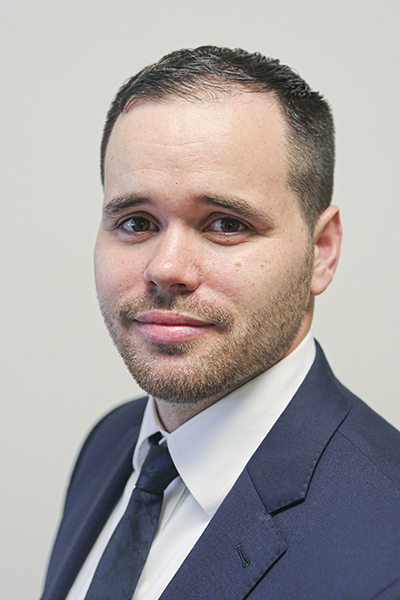David Silverman’s choice to become a clinical pharmacist was inspired by a key mentor in his childhood—his grandfather.

“I used to go to the pharmacy department at his hospital every day after school, where he would take me on rounds in the intensive care unit or I would watch him work until it was time to go home,” Silverman remembers. “My grandpa was a guru when it came to pain management, and established a pain management program that was recognized by the Joint Commission in the Jersey City Medical Center that served as a role model for other hospitals to follow.”
Now, as Prime Healthcare’s vice president of pharmacy services, Silverman likewise follows in his grandfather’s footsteps and is proud to continue the family legacy.
Silverman developed a passion for critical care, specifically, during school because of his interests in cardiology and infectious diseases. He graduated from Rutgers in 2012 and pursued a first-year postgraduate residency at Hackensack University with a critical care focus.
“During my residency training, I also had the opportunity to obtain my teaching certification through Rutgers’ postdoctoral teaching certificate program,” he says. “After graduating residency, I spent a year working as an overnight staff pharmacist and then transitioned to a critical care pharmacist role in St. Michael’s Medical Center (SMNJ), which is an acute care community teaching hospital in Newark, New Jersey.”
During his time as a critical care pharmacist, Silverman achieved dual board certification in pharmacotherapy and critical care.
At the time, SMNJ was going through a period of uncertainty, as it was up for sale and on the verge of bankruptcy, but Prime Healthcare stepped in, and after acquisition, was able to turn it around.
Today, Prime Healthcare has expanded to forty-five hospitals in fourteen states in a relatively short period of time, which quickly created a need to standardize many aspects of the hospitals—especially with regards to medication management, contracting, compliance, policies, and procedures. That created a fortuitous opportunity for Silverman, who says the timing helped propel his career.
“I primarily rounded with an interdisciplinary team in the ICU, but there were a lot of other opportunities available,” he says. That included becoming a member of the code response team, where he identified areas for improvement, including optimization of the code cart contents, medications on override, how the codes were managed, hardware issues, AED distribution, and implementation of targeted temperature management (TTM) for cardiac arrest patients.
In time, Silverman’s solid work led to his promotion to the chair of this interdisciplinary committee, which in turn led to him receiving the Lester Z. Lieberman Award for Humanism in Healthcare.
Prime’s hospital acquisitions also occurred as the corporate pharmacy team was in the process of expanding with the addition of a VP of pharmacy role, another regional pharmacy director role, and a corporate clinical pharmacy director role—the last of which Silverman took on following Prime’s acquisition of SMNJ.
“In this role, I helped to promote the standardization of clinical operations, establishing a corporate formulary, criteria of use for restricted agents, collaboratively starting a corporate pharmacy and therapeutics committee to oversee the clinical strategy and drive change,” he says. “Prime converted GPOs (HealthTrust) in March of 2018 and then converted wholesalers (Cardinal) in February of 2019.”
These conversions created a very valuable opportunity to hit the reset button with system standardization and contracting and have also played a critical role in streamlining clinical initiatives.
Other notable initiatives have been the formation of a national purchasing committee, purchasing policy, and system standardization executive summary document and the formation of clinical subcommittees (antimicrobial, anticoagulation, opioid) to ensure that Prime can leverage its internal expertise and not reinvent the wheel.
[T]he other key to success is to ensure that there is an appreciation for variance—that a one-size-fits-all model doesn’t work in every case.
The effects of standardization are evident in Prime’s drug spend trends. While the general trend in healthcare is a 4 to 8 percent increase in drug spend annually due to inflation, Prime’s total annual spend has remained flat from 2016 to 2019, but it’s added a total of five hospitals since 2016, and it’s seen a large shift in how those dollars are distributed (inpatient vs. outpatient, infusion, retail, and contract pharmacy)
“A prioritized standardization strategy is essential for success when operating with an organization of this size and diversity, but the other key to success is to ensure that there is an appreciation for variance—that a one-size-fits-all model doesn’t work in every case,” Silverman says. “A lack of appreciation for this can result in significant failures or poor outcomes.”
Recognizing these challenges and tailoring its standardization initiatives to them has helped Prime tremendously; and for Silverman personally, his experiences taught him firsthand that clinical pharmacy services can impact patients outside of medication-related areas.
Over the years pharmacy advocacy has evolved the profession from a primary dispensing role to a more clinical role, and this is an area that Silverman is especially passionate about.
“Advocacy is essential for all professions, but I think that it is especially important for pharmacy because of the way various stakeholders view pharmacy’s role in overall operations,” he says.
For example, many medical professionals in the hospital setting think that pharmacy’s primary role is to ensure timely and safe medication management (order verification, preparation, and distribution); C-suites see pharmacy as a very high-cost center; for quality or performance improvement teams, pharmacy plays a key role in medication safety activities and quality reporting.
“Most stakeholders don’t have visibility to all aspects of pharmacy roles and responsibilities, nor do they see that we can bring a lot more to the table and drive clinical value for the patients,” Silverman says.
Luckily, by continuing on the path he’s on, Silverman knows he can impact the care of a large number of patients and drive value even more.
HealthTrust is committed to strengthening provider performance and clinical excellence through an aligned membership model and the delivery of total spend management solutions that leverages its operator experience, scale and innovation. Members include over 1,500 hospitals and health systems, and more than 31,000 non-acute care sites. Visit www.healthtrustpg.com to learn more.
Verity Solutions is an award-winning provider of 340B software and services, earning Category Leader for 340B Management Systems in the Best in KLAS: Software & Services report since 2018. We are your comprehensive solution for split billing, contract and specialty contract pharmacy, compliance management, and purchase analytics. www.verity340b.com


